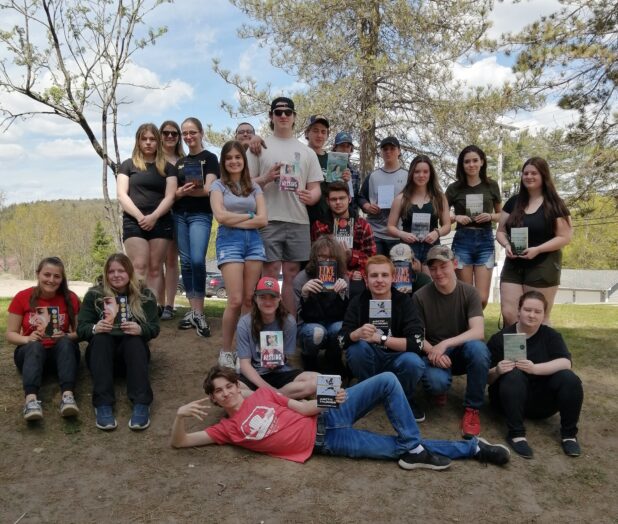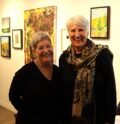Headline News
Taylor Reads celebrates the resilience of the human spirit through Indigenous authors
June 6, 2023

By Bill Kilpatrick
On May 31, students in Heather Taylor’s Grade 11 English class at North Hastings High School gathered in front of a panel of judges and their peers to present their Indigenous themed novels and try to convince the judges that their novel was the best to read. If successful they received one of the Taylor Reads prizes which came in the form of medals, trophies, and gift cards and of course bragging rights. Taylor Reads, a take-off of the Canadian Broadcasting Corporation’s contest Canada Reads, began back in 2017 with the goal of exposing students to Indigenous literature. The contest challenges students to read and learn about an Indigenous themed novel over 10 days and then present their findings to a panel of judges.
According to Taylor, students must analyze the novel and be prepared to discuss the structure of the novel including the setting, the plot, character development as well as different literary devices and features of narration. The contest not only challenges students to learn about Indigenous literature but, as Taylor points out they “have to learn to work collaboratively [in groups] and problem solve issues as they arise.” The contest further offers the students an opportunity to “hone their oral communication skills by presenting to a large audience thus gaining confidence in themselves and each other.” The process, however, is not static and changes every semester due to the differing needs of the individual students. But essentially the learning process for the contest is a “student lead initiative” as they pick their own books and choose whether to work alone or in groups as large as four.
The theme of this semester’s contest was resilience. Taylor hoped that, despite the many and varying themes within the novels, the students got an understanding that, “Indigenous people are resilient. Indigenous people are here. Indigenous voices are important, and Indigenous stories are vital” for people to fully understand both the history of Canada and some of the current issues surrounding Canadian-Indigenous relations. The themes in the 12 novels varied widely, but often touched on similar and challenging topics that ranged from colonialism, oppression, trauma, suicide, sexual abuse, and exploitation, missing and murdered Indigenous women, among many others. These topics, which are challenging for students to navigate, are however essential for an understanding of the past and present concerning Indigenous-Canadian relations.
Despite the trying topics, the novels also highlighted themes that inspired hope for the students. One group spoke about the reclaiming and celebration of Indigenous culture, while others spoke about the significance of having empathy towards each other and the importance of challenging stereotypes and misconceptions concerning Indigenous peoples. Others highlighted the struggles for identity and the ability of Indigenous people to overcome the trauma that has been the result of living in a Judeo-Christian culture that historically has attempted to obliterate Indigenous identity and traditions. As Taylor says, “The take-away from the trauma in the end is that the Indigenous people are still here, Indigenous people are resilient and important and play a huge role in Canadian society.”
Selena Marois, one of the two students who presented the book The Marrow Thieves (2017), by Cherie Dimaline had a deep connection to the resilience of one of the characters in her book. The character’s name was “Frenchy” and part of the book revolved around the personal difficulties that he went through trying to cope with the loss of a loved one. Marois explained that identified with the character as she has also lost a loved one, and empathized with both Frenchy’s resilience and his struggle to go on living and finding meaning in the face of such a devastating loss. Marois described how, like Frenchy, she still struggles to both deal with and overcome her feelings of grief and yet still honor the memory of her loved one. Marois and her partner Jasmine Chiasson, further epitomized the theme of resiliency by overcoming their fear of public speaking and winning second place at the Taylor Reads competition.
McKailyn Conlin, who argued for the book Medicine Walk (2014) by Richard Wagamese, explained that she gained a lot of insight into Indigenous issues such as systemic racism and stereotypes from reading Wagamese’s book. Medicine Walk takes place in the 1950s and is a story about redemption and the struggle for identity as it follows 16-year-old Franklin Starlight as he helps his alcoholic terminally ill father, Eldon Starlight, search for a place for his final internment. Conlin spoke about how the novel gave her insight into issues that Indigenous people have had to struggle with and still struggle with today. Conlin pointed out that Wagamese made Eldon Starlight an alcoholic and how for a long time Indigenous people in Canada were characterized as people who were prone to addictions by their nature. Conlin pointed how this is a false stereotype as addictions usually have an underlying cause such as trauma. Conlin then used Eldon Starlight’s character as an example pointing out that Eldon was a Korean war veteran whose “buddy was shot and he had to end his buddy’s life to put him out of his misery because they were so far behind enemy lines they couldn’t get a medic.” Conlin further explained how Eldon could not come to terms with this trauma and instead tried to mask his pain with alcohol. Trauma is often generational and much of the trauma that was experienced by Indigenous people and non-Indigenous people alike often gets carried over to the next generation resulting in the illusion of addiction as a personal defect, however it is often the trauma and not any personal defect that leads to addictions. Conlin’s insights and her ability to present the author’s ideas and concepts succinctly, without any notes at all, earned her an award for best overall presentation.
The challenge for any educator is to not only get students to read books, but to get them to engage with the literature, analyze it, speak about it, and apply what they have learned. Taylor appears to have found a way to not only do the aforementioned things, but she has gone above and beyond them. Troy Maracle, the Indigenous education lead for Hastings and Prince Edward District School Board and Taylor Reads judge, says that Taylor has not only found a way to engage students with different books in a different way, but that Taylor has found a “really creative and innovative way to get students to engage in books.” Taylor Reads not only promotes educational and literary skills, but it encourages empathy and understanding, not only of Indigenous issues within Canadian society, but of the human condition and the resiliency of the human spirit. This is important as Maracle points out because it is only through understanding that we can find truth and in truth there is hope for a better tomorrow. Part of celebrating the resiliency of the human spirit, as Maracle points out, is the celebration of the “beauty, brilliance and resilience of Indigenous people.”

















